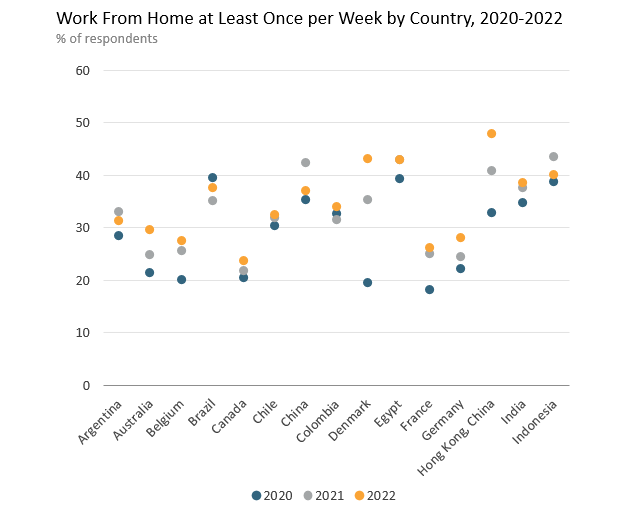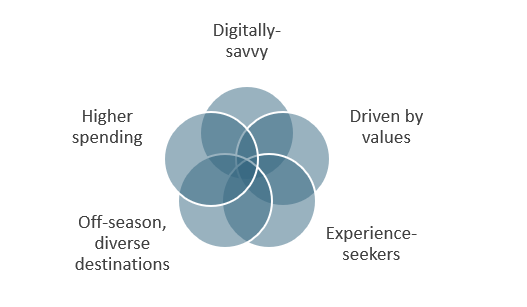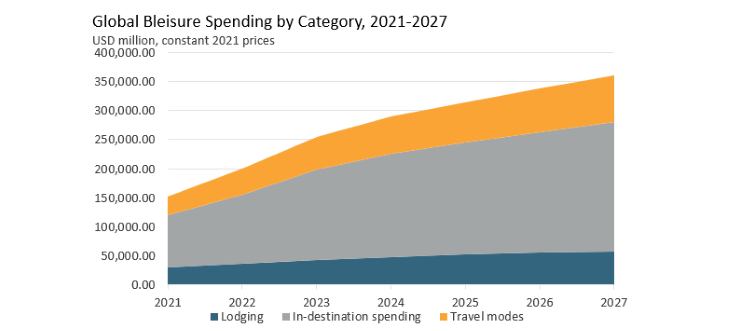Bleisure, or blended travel, has become one of the most important post-pandemic travel opportunities, and is fuelling the industry’s rebound in a more long-term, sustainable way.
While bleisure was an important incremental growth opportunity long before the pandemic arrived, it has become something else entirely in the wake of growing flexibility in the workplace and consumers with fresh perspectives on travel and where it overlaps with both their professional and personal interests.
Fuelling the travel rebound
This shift in mindset benefits travel. Existing operators are finding room to pivot to new needs and rebuild sales lost to the pandemic, while new operators are finding room to differentiate with exciting new options. These new options, blurring the lines of business and leisure, are creating “better” ways to travel because they are high-value, arguably more intentional and thoughtful, and also varied.
The spectrum of options emerging includes the permanent flexibility of digital nomads and gig economy workers, as well as work from anywhere allowances and workcations, group options such as corporate retreats, and the classic leisure add-ons to traditional business trips.
Collectively, this represents a broad shift away from mass tourism, that was pushing the market towards an unsustainable boiling point before the pandemic arrived. Now, bleisure and blended options are motivating consumers to travel differently, easing bottlenecks and traditional travel pain points, and helping travel rebound in a more responsible and sustainable way.
New working realities, new preferences
This shift stems directly from the pandemic, which in one fell swoop forced a pause on all non-essential travel in most regions of the world by early 2020. Most trips of all kinds slowed to a halt, and since then, both companies and individuals have had time to reflect on why they travel at all.
Digital communication technologies such as Zoom, Slack and Teams quickly replaced internal office meetings and external business trips with the ability to meet remotely online. MICE has also made adaptations to remain available during the pandemic, and now sees new benefits in allowing more people around the world to participate remotely. These adaptations are practical, efficient, and cost-saving, and are therefore quickly becoming permanent.
While few companies believe tech to be a perfect replacement for the office, it has effectively changed office working culture. Many working consumers left their jobs – a phenomenon known as the “Great Resignation” – to seek out new companies that offered more flexible working arrangements, some even prioritising a better work-life balance over salary. This represents a conscious effort to reshuffle priorities, making space for things like travel that people value. This is especially true for younger generation workers such as millennials and gen Z, who tend to favour experiences and a strong work-life balance.

New and existing travel operators, as well as destinations, are catering to these working consumers in new ways, targeting leisure seekers with the option to remain in-destination longer by working, rather than business travellers with incremental moments of leisure.
Creating value and driving growth
Travel operators and destinations that do pivot to this emerging demand are likely realising these consumers are high-value travellers. For example, bleisure travellers tend to remain in-destination for a longer period of time, given the need to make time for both work and leisure activities. Travellers who remain in-destination longer naturally spend more per trip.

Bleisure travel is also generally more flexible, meaning unlike classic business trips, bleisure seekers are often not bound to specific events, and can travel at any time of year. This could ease travel flow bottlenecks traditionally seen during peak-season travel periods to mitigate against over-tourism.
Equally, bleisure travellers are more flexible in terms of travelling to any location, and often seek out alternatives to highly-visited destinations, which again eases travel flow bottlenecks in the most-visited places. The effect is a more equitable distribution of travel opportunities and spending.
Emerging market opportunities
Working consumers who are fortunate enough to have flexible working arrangements tend to be digitally-savvy and work for higher pay, which means they can likely afford higher-quality travel options. Many also travel together with friends and family, transplanting their lives for a time in a destination, and need access to the same things they would need at home, in addition to experiences and leisure activities. In this way, bleisure creates secondary spending opportunities beyond pure travel spend, that benefits destinations and local businesses in direct and indirect ways.

The market for bleisure is clearly attractive, and is already big. Estimated at USD200 billion in 2022, bleisure spending is expected to more than double between 2021 and 2027, making it one of the fastest growing travel segments. Bleisure will support recovery and create new growth opportunities in a more responsible and sustainable way.
For more insight read our latest global strategy report, Bleisure and the Future of Work and Travel.
